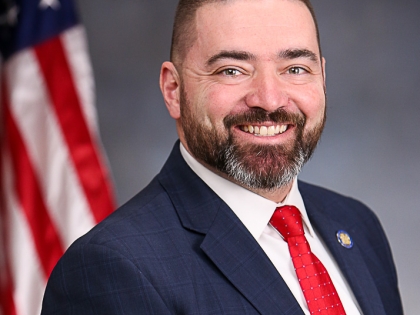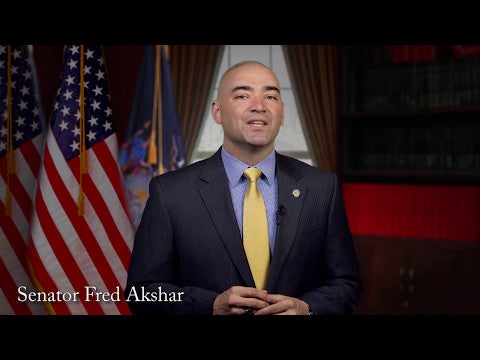
Senate Passes Budget that Protects Taxpayers, Provides Record Investments in Clean Water in Local Schools, and Helps Make New York More Affordable for Individuals, Families, and Businesses
April 9, 2017

Senator Fred Akshar: Hard Fought Compromise Leads to Tangible Results in This Year's Budget
On Sunday, my colleagues and I passed a $153 billion 2017-18 state budget that focuses on improving the business climate in New York, increases funding for schools, provides more support for heroin and opioid addiction prevention and treatment, and most importantly provides tax relief that help to make living, working and raising a family more affordable for all New Yorkers.
Negotiations took longer than expected, but I believe the final agreement was worth the wait and truly incorporates our top priorities while continuing our commitment to improve economic opportunities for everyone.
Am I happy about everything in the Budget? Of course not.
When fighting for a responsible budget, it's not always about getting what you want accomplished, it's about knowing when to put your foot down and say NO. This is exactly what we did when we stopped the Governor and the New York City Democrats from imposing nearly $800 million in new taxes and fees. Where we're from, that's just a bad way to do business.
Prevention and Treatment to Fight the Heroin and Opioid Crisis: When I first took office, my number one priority was addressing the heroin and opioid crisis plaguing our communities across the state.
I'm excited to report that we included $214 million in the Budget to combat this epidemic through treatment and prevention services. A full $10 million more than the Governor originally proposed. Most importantly, this is $31 million more than last year.
Fighting for a Better Business Climate by Reforming Workers' Compensation: My second priority since becoming state senator was creating a better business climate in this state. Through traveling the district, listening to business owners and forming a local business advisory council, we identified the broken Workers Compensation system as the number one thing to work on reforming this year.
After a lot of hard work, I'm proud to report that we passed the most comprehensive Workers' Compensation reforms in over a decade. That means hundreds of millions of dollars in savings for our businesses, non-profits and municipalities across the state. It's a huge win, and I couldn't have done it without input from the people I represent.
There's more:
Protecting Taxpayers: We're providing another $3 billion in property tax relief through the state’s STAR program, including nearly $500 million for another round of rebate checks. We also rejected the Governor’s proposal to cap STAR benefits so seniors and homeowners get every dollar they deserve in tax relief. We've also included a total of $47 million in additional tax relief to provide our hardworking middle class families with a Child and Dependent Care Tax Credit.
Funding For Our Schools: We increased school aid by 4.4 percent, or $1.1 Billion dollars - that's double the increase of almost every other area of the budget. I fought hard to bring an additional $20.1 million to our local schools in SD52.
Supporting Infrastructure: We increased funding for local road and bridge repair by $105 million for a total of $653 million this year. We also had a portion of that funding earmarked for the cost of winter storm recovery in our community by distributing these dollars through the CHIPS formula. We're sending taxpayer dollars back where they belong, into the hands of the men and women doing the work everyday.
Fairness for Direct Care Workers: We fought for and won a multi-year boost in wages to compensate direct care workers who care for the most vulnerable members of our community. Direct care workers provide essential services for those with developmental and other disabilities, mental health and substance abuse issues in our community. For too long government had kept their wages down, making it harder to attract skilled workers and continue employing those with true passion for their profession. Now, they will finally be appropriately compensated for the important work they do.
We stopped the Governor and the New York City Democrats from imposing nearly $800 million in new taxes and fees. Where we're from, that's just a bad way to do business.
Protecting Our Water: We secured the largest investment in clean water in state history - $2.5 billion and growing - to fund clean water projects and infrastructure needs across the state.
Bringing Ride Sharing to Upstate: Finally, we legalized ride sharing services like Uber and Lyft, so Upstate communities have more transportation options and safe ways to get where they need to go.
Adjusting the Governor's Tuition Plan: Next, we addressed the Governor's free college tuition plan. We already have tuition assistance for many low income families, but the Governor wanted to extend that plan to include more middle class families as well. Taking care of the working middle class is a priority of mine as well.
This plan was one of the more controversial issues for the people I represent in the 52nd District. But through traveling the district and conducting my Community Voice Survey, there was one thing everyone seemed to agree on: anyone receiving tuition assistance must be held responsible to certain standards, like a minimum GPA and a requirement that they stay and live in New York for at least four years after they graduate. We fought for checks and balances and I'm glad to report that we got them.
No Tuition Assistance for Undocumented Immigrants: We flat out rejected the Governor's proposal for free college tuition for undocumented immigrants. That's something 82% of my constituents who took the Community Voice Survey opposed and we made sure it stayed off the table.
Raising the Age Responsibly to Protect Our Communities: The next controversial issue was Raise the Age. I speak to you on this issue as your Senator, however in dealing with this issue, I leaned on my prior occupation as a member of law enforcement. We were able to pass responsible Raise the Age reform that makes sure non-violent 16 and 17 year olds are not tried as adults, but still protects our communities from young perpetrators of violence, rape and other heinous crimes. As I've said before, I agree wholeheartedly that 16 and 17 year olds should not be housed with adults in correctional facilities. I also believe that 16 and 17 year olds should receive necessary services to help ensure they become successful, responsible and law abiding members of our communities.
In the end, as always, the only way to move forward in a large diverse state like ours is through hard fought compromise, and that's what we were able to do in this year's Budget.
Most importantly, I want to thank you, the people of 52nd District for continuing to make your voices heard. By coming out to our Town Hall meetings, responding to our surveys, by sending me emails, comments and messages, you've allowed me to take your thoughts and opinions to Albany and make sure your interests are properly represented.
There's much more information on the Budget available below.
The work isn't done, and I'll continue traveling the District, meeting with you, and working to make our community a better place to live.
Senate Passes 2017-18 State Budget
The New York State Senate passed a $153 billion 2017-18 state budget that protects taxpayers, reduces regulations that strangle business growth, and continues the Senate’s commitment to improving economic opportunities for all New Yorkers.
Senate Majority Leader John J. Flanagan said, “All New Yorkers scored a victory with this budget, as the Senate led the way on controlling state spending, protecting the taxpayer, and making critical investments in measures that will protect public health and grow our economy. As session continues, we will keep focused on these and other priorities that improve our communities and create better opportunities for the hardworking people of this great state.”
The final budget keeps within the state’s self-imposed spending cap while incorporating many of the Senate’s top priorities, including: record investments in clean water protection and local schools; the most significant workers’ compensation reform in a decade; expanded ridesharing outside New York City; enhanced college affordability; and continued tax relief for residents and businesses.
PROMOTING ECONOMIC DEVELOPMENT
Reforms to Workers’ Compensation
The Senate successfully led the fight for the most significant workers’ compensation reform in a decade. This top Senate budget priority includes sensible reforms that help businesses, local governments, and not-for-profits achieve meaningful savings, while also enhancing the protections in place for injured workers.
The measures will make it more affordable to do business in New York, with employers expected to see savings this year in the form of rebates and hundreds of millions of dollars more in ongoing annual savings on premium costs after reforms are implemented.
Savings for Employers:
- Reforming Temporary Benefit Timeframes: While 2007’s workers’ compensation reforms capped the number of years an injured employee could be eligible for permanent benefits, injured workers are currently eligible to receive temporary benefits over several years. The new budget institutes a general rule of 2.5 years for an employee to claim temporary benefits, subject to the “safety valve” (detailed below) that allows an injured worker to not lose benefits if they still need them. As a result, employer contributions are expected to be reduced by approximately $350 million each year;
- New Medical Impairment Guidelines for Scheduled Loss of Use Awards: The budget requires the state Workers’ Compensation Board (WCB) to issue new medical impairment guidelines by the end of this year. The guidelines would also be updated – for the first time in decades for some injuries - to reflect advances in modern medicine that enhance healing and result in better outcomes for patients. The new guidelines are expected to save employers hundreds of millions of dollars each year;
- Creation of a Prescription Drug Formulary: Doctors would be able to consult a new, comprehensive list of high-quality, cost-effective medications that are pre-approved to be prescribed and dispensed to injured workers. In addition, the formulary would include non-preferred drugs that can be prescribed with prior approval to ensure the worker gets the most appropriate care; and
- Rebates for Current Year’s Premiums: Since employers have already begun paying premiums based on the 2017’s workers’ compensation premium estimates, businesses will receive a rebate at the end of the year once administrators calculate final year-end savings.
Increased Protections for Injured Employees:
- Expanded Safety Net for Those Most Seriously Injured: Currently, only workers determined to be more than 80 percent injured qualify to apply for extended permanent benefits once the original benefits expire. The budget increases eligibility by including workers determined to be more than 75 percent injured;
- “Safety Valve” for Temporary Benefits: If an injured worker can demonstrate they continue to need temporary benefits while healing from an injury, the budget would allow them to apply to the state WCB to continue those benefits; and
- Common-Sense Reform of Permanent Benefit Requirements: For workers who receive permanent benefits and cannot enter the job market because of their injury, the budget would enable them to continue to receive benefits and relieve them of the requirement to stay attached to the labor market.
Expanding Ride-sharing
The enacted budget provides ride-sharing companies with the ability to expand operations outside of New York City, creating new jobs and offering more safe, reliable transportation options to communities and visitors upstate and on Long Island.
Rejecting Fee Increases
The final budget rejects hundreds of millions of dollars in several onerous taxes and fee increases proposed by Governor Cuomo, including new and increased DMV fees and new taxes on internet purchases.
STRENGTHENING OUR INFRASTRUCTURE
The Largest Single Investment in Clean Water in New York’s History
The budget makes a historic investment of $2.5 billion to ensure all New Yorkers have access to clean, safe drinking water. The Senate is leading the charge to ensure the state provides the resources necessary to address extensive water quality issues and infrastructure needs across the state. The final budget includes:
- $1 billion for a new Water Infrastructure Improvement Act of 2017 to fund municipal water infrastructure projects over the next five years;
- Continued funding ($245 million) of the Water Quality Improvement Program grants;
- $150 million for a new intermunicipal water infrastructure grant program to help fund projects that serve multiple municipalities and promote cost savings;
- $100 million in new funding for municipal water quality projects that would not currently qualify for existing state grants;
- $75 million for a new state rebate program to incentivize the replacement of failing septic systems and cesspools;
- $20 million for the replacement of lead pipes, with preferences given to communities with a high percentage of elevated childhood lead blood levels;
- $100 million over five years for the state Superfund program to be used for clean water projects; and $30 million over five years for solid waste and drinking water mitigation and remediation projects;
- $275 million in continued funding for Clean Water and Drinking Water State Revolving Funds;
- $10 million for a new emergency infrastructure loan program to repair breaches of infrastructure that causes an imminent threat to the public health or the environment; and
- Funding for new measures to control point-source pollution, protect water sources, promote green infrastructure, address water contamination, and improve data collection to better track water quality information.
Support for $300 Million Environmental Protection Funding
The budget continues the state’s record commitment to the protection of natural resources with $300 million for the Environmental Protection Fund (EPF). The EPF helps protect water resources through the preservation of open spaces and upgrading sewage treatment plants, among many other environmental initiatives. To further support clean water projects, $20 million from the EPF will help support existing funding in the Water Quality Improvement Program.
Clean Water Protections
As proposed by the Senate’s Health and Environmental Conservation committees earlier this year, the final budget creates the Emerging Contaminant Monitoring Act to require all public water systems to test for unregulated contaminants identified by the Department of Health that are known, or anticipated to be present in drinking water, including PFOA, PFOS and 1,4Dioxane. A new Drinking Water Quality Council is also established in the budget after being advocated by the Senate and will bring together experts to review existing evidence, study contaminants of concern, and make recommendations to the Department of Health regarding drinking water safety, including state specific thresholds and public notice procedures.
Increased Support for Transportation Infrastructure
The budget includes significant increases for transportation infrastructure that were successfully advocated for by the Senate. The budget maintains fairness in funding and a more equitable and regionally balanced transportation plan. An increase of nearly $1.7 billion over last year brings the total transportation funding to $29 billion, including $2 billion for the Thruway Authority. The budget includes:
- An approximately $1.5 billion increase this year to accelerate road and bridge projects throughout the state;
- $65 million increase for a total of $503 million this year and $2.4 billion over five years for the Consolidated Local Street and Highway Program (CHIPS), with the additional funding earmarked for Extreme Winter Recovery;
- $50 million increase for the local BRIDGE NY program for a total of $150 million this year and $550 million over five years, including $70 million earmarked for culverts);
- $20 million increase for a total of $104 million this year and $417 million over five years for non-MTA downstate and upstate transit systems capital; and
- $10 million increase for a total of $27 million this year and $292 million over five years for aviation.
In addition, the budget includes:
- $10 million in additional funding (total: $512 million this year) for non-MTA downstate and upstate transit systems operating aid;
- $4 million this year in operating aid for rural transit systems;
- continued funding for the local PAVE NY program to help fix New York’s roads (total:
- $100 million this year; $500 million over five years); and
- $352 million for rail freight over five years.
CONTINUING AND EXPANDING TAX RELIEF FOR NEW YORKERS
Full Funding for STAR
This year, more than $3.15 billion will be used to fund New York’s STAR and Enhanced STAR property tax programs, and changes were made to ensure the state’s STAR payments to taxpayers are made on time. To date, STAR and Enhanced STAR have delivered significant tax relief to millions of middle-class families and senior citizens statewide.
Blocked the Capping of Taxpayers’ STAR Savings
The Senate succeeded in blocking an Executive Budget proposal to cap the amount of savings property owners receive for STAR at this current year’s levels. As a result, the final budget saves local taxpayers an estimated $50 million this year and nearly $700 million over five years.
Delivering Another Round of Rebate Checks to Property Taxpayers
The 2017-18 State Budget fully funds another installment of property tax rebate checks, providing millions of homeowners with $453 million in direct, much-needed tax relief through a check in the mail. When combined with the STAR and Enhanced STAR programs, these checks will bring total property tax relief in this year’s budget to $3.6 billion.
New Tax Relief for Working Parents
The budget includes $47 million in additional tax relief for working families’ child care expenses. The state’s Child and Dependent Care Tax Credit is expanded for taxpayers with incomes between $50,000 and $150,000 and the current cap on child care expenses would rise from $6,000 to a maximum of $9,000 (depending on the number of children) for families with up to five children.
Protecting the Middle Class Tax Cut
The Senate ensured that the Middle Class Income Tax Cut created by the Senate last year remained untouched in this budget. By 2025 when the tax cut is fully phased in, it will bring tax rates down to the lowest rate since 1948 -- provide an average savings to individuals and tens of thousands of small businesses of $700 per taxpayer per year, for an annual total savings of $4.2 billion.
MAKING NEW YORK MORE AFFORDABLE
Enhancing College Affordability
The budget modifies and strengthens the Governor’s original “free college tuition plan” in a number of smart and responsible ways consistent with what the Senate has advocated for in recent years to help make college more affordable and accessible for more middle class New Yorkers, including:
- Providing a record-high level of Tuition Assistance Program (TAP) funding - more than $1.1 billion this year – and helps more than 25,000 additional students better afford the cost of a college education;
- Adding $19 million for a new Enhanced Tuition Award initiative specifically designed to help students at private colleges and universities;
- Helping public college students participating in the new program by providing up to $5,500 per student, with SUNY and CUNY committing to waive remaining tuition costs if students follow the program’s requirements;
- Creating key measures to promote student responsibility, including minimum GPA standards, steps to enhance on-time graduation, and a requirement that participants live and work in New York after graduation;
- Delivering $3.1 million in tuition assistance for part-time community college students - a step that will help working parents.
To continue supporting New York’s public universities, the budget also:
- Includes new language guaranteeing state support of SUNY and CUNY in future years;
- Launches the largest infrastructure program for SUNY and CUNY campuses in years -- updating and improving campuses across the state; and
Ensures strong support for community colleges, including a $50 increase per full time equivalent (FTE).
Supporting Fair Wages for Direct Care and Clinical Professionals
After the Senate advocated for funding that was absent from the Executive Budget proposal, the final budget provides a $146 million multi-year boost in wages to compensate direct care and other clinical professionals for the important work they do in caring for our most vulnerable adults. The funding helps appropriately adjust salaries at not-for-profits that employ workers who provide services for individuals with disabilities, as well as staff at not-for-profits under the purview of the Office of Alcohol and Substance Abuse Services and the Office of Mental Health.
The new funding breaks down to $55.5 million in additional wage compensation for direct care staff in the 2017-18 fiscal year, followed by an additional $90 million starting next year that would include clinical staff as well.
RECORD FUNDING FOR LOCAL SCHOOLS
The enacted budget includes a record level of school aid funding of approximately $26 billion. This is an approximately $1.1 billion increase over last year, equating to 4.4 percent, and continues the growth of education funding at twice the rate of the rest of the budget. New York State’s total commitment to supporting public education, when combined with the STAR school tax relief program, will be approximately $29 billion this year. Education funding highlights include:
- The Senate rejecting the Executive Budget's proposal to eliminate the Foundation Aid phase-in and securing an additional $272 million in Foundation Aid, bringing the year-toyear increase to $700 million and total funding to $17.2 billion -- ensuring that every school district will see an increase in funding of at least 2.74 percent;
- Increasing funding in tuition payments and facilities aid for charter schools;
- Adding $14 million for nonpublic school mandated costs, including $7 million for immunization mandates;
- Providing $25 million in Smart School Technology funding and $5 million to support STEM in nonpublic schools; and
- Securing an additional $25 million in new funding for nonpublic schools, day cares, and community centers at risk for hate crimes.
This education support builds on the Senate’s record of delivering for schools and ensuring all students have the resources they need to succeed, including the elimination of the New York City Democrat-imposed GEA school funding cuts.
PLANNING FOR NEW YORK’S ECONOMIC FUTURE
Record-Level Job Training Investments
The enacted budget includes record funding of more than $15 million for dozens of job training and workforce development initiatives, nearly all of which were advocated for by the Senate’s Task Force on Workforce Development and included in the Senate’s one-house budget.
Highlights include:
- Nearly $4 million for Workforce Development Institute (WDI) – a highly successful notfor-profit that works with businesses and the AFL-CIO to provide focused training of workers and for workforce transition support to help stop the outsourcing of jobs to other states.
- $3 million for WDI’s Manufacturing Initiative;
- $980,000 for the Chamber of Commerce On-the-Job Training Program;
- $600,000 for Building Trades Pre-Apprenticeship Programs; and
- $140,000 to establish four Solar Thermal Technology Training Programs across the state.
Partnering with Higher Education to Prepare Workers
The Senate’s Task Force also delivered on initiatives to ensure New York’s future workforce is prepared for the skilled jobs available in the state by funding:
- $5 million for the Next Generation Job Linkage Program that works with employers to help identify potential jobs, define their necessary skills, and provide employees with the appropriate training;
- $5 million for the SUNY/CUNY Apprentice Initiative that helps employers refine the skills of new hires and enables more experienced employees the chance to upgrade their skills; and
- $9.7 million increase (for a total of $739 million) for SUNY and CUNY community colleges, which are essential in helping young people gain the skills and education that will increase their employment opportunities. The new budget increases full-time equivalent (FTE) funding by $50 and base aid will be $2,747 per FTE for the 2017-18 Fiscal Year.
Growing New York’s Agriculture From The Ground Up
Once again, the Senate succeeded in restoring nearly $10 million (for a total of $51 million) to fund initiatives not included in the Executive Budget that will give New York farmers a leading edge over other states to continue growing our agriculture industry. Dozens of programs - investments in cutting-edge agricultural research, support for the next generation of family farmers, environmental stewardship, and protections for plant, animal, and public health – will be funded, with significant increases including:
- $1.5 million (for a total of $1.9 million) for the Farm Viability Institute to help New York’s farmers become more profitable and to improve the long-term economic viability and sustainability of farms, the food system, and the communities which they serve;
- $1 million (for a total of $9.3 million) for Agri Business Child Development, to provide quality early childhood education and social services to farm workers and other eligible families;
- $1 million (for a total of $5.4 million) for the Cornell Diagnostic Lab;
- $516,000 (for a total of $1.2 million) for FarmNet, Farm Family Assistance; and
- $300,000 (for a total of $842,000) to expand FFA and help prepare young New Yorkers to become leaders in agriculture.
Helping the Hungry Through Farming
The Senate succeeded in including “Farm-to-Food-Bank” in the final budget after last year's legislation was vetoed. More fresh, New York-grown produce will be available to help feed the hungry by allowing farmers to claim a tax credit for produce and other farm product donations to food banks or other emergency food programs.
PROTECTING NEW YORKERS’ HEALTH AND SAFETY
Record Levels of Funding to Fight Heroin and Opioid Addiction
This year, the Senate’s Joint Task Force on Heroin and Opioid Addiction is continuing its work addressing the drug epidemic by securing $214 million in this year’s budget – a record-high level of funding. This will be used to strengthen prevention, treatment, recovery and education services across the state.
Helping Our Veterans
The State Budget for 2017-18 reflects the Senate Republican Conference’s unwavering support for the heroic service men and women who have sacrificed so much on behalf of our nation.
Veterans-related budget increases include:
- $1 million in new funding for veteran-to-veteran support services run by Veterans Service Organizations;
- $310,000 (total: $3.1 million) for the Joseph P. Dwyer Veteran Peer-to-Peer Program;
- $250,000 increase (total: $500,000) for the Veterans Outreach Center in Monroe County;
- $120,000 in new funding for Veterans of Foreign Wars NYS Chapter Field Service Operations; and
- $10,000 (total: $50,000) for the Vietnam Veterans of America New York State Council.
Other programs receiving funding include:
- $500,000 for the NYS Defenders Association Veterans Defense Program;
- $200,000 for Legal Services of the Hudson Valley Veterans and Military Families Advocacy Project;
- $200,000 for Warrior Salute;
- $100,000 for the Veterans Justice Project;
- $100,000 for the SAGE Veterans Project;
- $200,000 for Helmets-to-Hardhats; and
- $25,000 for the Veterans Miracle Center.
Creating Healthier Communities
The budget includes $500 million for the Health Care Facility Transformation Program to support capital improvements at hospitals, other health care facilities and community-based providers, and provides an opportunity for increased eligibility throughout the state. In addition, the budget includes:
- $24 million for cancer services;
- $12 million for chronic disease prevention (including diabetes, asthma, and hypertension);
- $26 million for Nutritional Information for Women, Infants and Children;
- $27 million for maternal and child health programs, and also includes language to provide Medicaid coverage for donor breast milk to help prevent deadly complications faced by premature infants in neonatal ICUs;
- $475,000 for women’s health initiatives;
- $400,000 for funding to address Lyme and other tick-borne diseases through research, education, and prevention efforts;
- $283,000 for the Adelphi Breast Cancer Support Program;
- $8.5 million in additional funding of the Spinal Cord Injury Research Board; • $9 million for the Doctors Across New York Program; and
- $1.3 million to support organ donation.
Supporting Seniors
The budget boosts support for a wide array of programs and initiatives that serve seniors, including funding for the following:
- $50 million for the Expanded In-home Services for the Elderly Program;
- $31 million for Community Services for the Elderly Program;
- $27 million for the Wellness in Nutrition Program;
- $27 million for Alzheimer’s and other dementia related programs;
- $1.2 million for elder abuse prevention initiatives to protect vulnerable senior citizens from abuse;
- $250,000 for Older Adults Technology Services;
- $86,000 for the New York Foundation for Seniors Home Sharing and Respite; and
- $32,000 for the Senior Action Council Hotline.
Keeping Communities Safer
Supporting law enforcement and keeping our communities safe and free from harm have always been among the Senate’s most critical priorities. The new 2017-18 State Budget reflects that commitment in a number of ways:
- In his Executive Budget, Governor Cuomo included a so-called “raise the age” proposal that raised significant public safety concerns. In the final enacted budget, the Senate worked to ensure that violent crimes, sex crimes, and other major offenses will still be treated as serious crimes to be handled by the Criminal Court system. We also worked to address and minimize the potential cost and logistical problems that the Governor’s original plan would have caused for local courts and law enforcement;
- $2.2 million in funding to provide support, protection and services to domestic violence victims;
- $2.7 million for Rape Crisis Centers to help victims of rape and sexual assault;
- $1 million to the New York State Police for a new Hate Crimes Task Force;
- $2.89 million to support important local law enforcement initiatives in communities across the state; and
- A new measure that increases reimbursable expenses to certain vulnerable crime victims, including those who are elderly, incompetent, or physically disabled.
###
Share this Article or Press Release
Newsroom
Go to NewsroomCharles E. Bilbrey, Jr.
May 15, 2017



